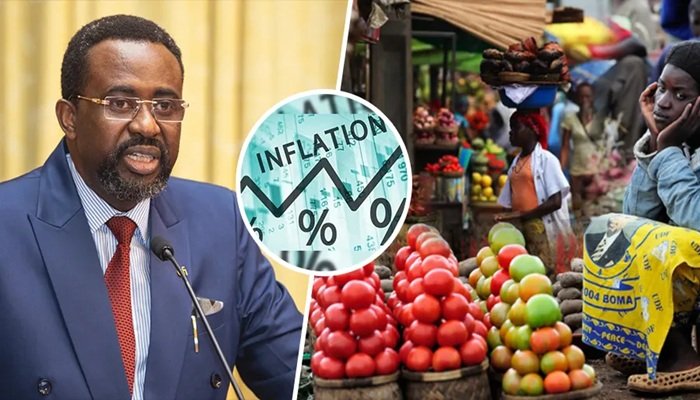Ghana’s fight against inflation appears to be yielding significant results as headline inflation dropped further to 8.0 percent in October 2025, marking the 10th consecutive monthly decline and the lowest level since June 2021.
According to data released by the Ghana Statistical Service (GSS), the latest figure represents a continued easing from 9.4 percent recorded in September 2025, bringing welcome relief to households and businesses across the country.
This milestone underscores the government’s and the Bank of Ghana’s (BoG) joint efforts to stabilize prices through coordinated monetary and fiscal policies, following years of double-digit inflation that peaked in 2022.
Factors Driving the Decline
The sustained fall in inflation has been attributed to several interlinked factors including a stable Ghanaian cedi, declining fuel prices, and improved food supply conditions nationwide.
Data from the GSS show that food inflation—often the biggest driver of headline inflation—fell sharply to 9.5 percent in October from 11.0 percent in September. Similarly, non-food inflation eased to 6.9 percent from 8.2 percent over the same period.
Inflation for locally produced items also saw a remarkable improvement, dropping to 8.0 percent in October from 10.1 percent a month earlier. This, according to analysts, points to enhanced stability in domestic production and distribution systems, supported by improved agricultural output and logistical efficiencies.
However, imported inflation inched up slightly to 7.8 percent from 7.0 percent, likely reflecting global logistics constraints and minor exchange rate adjustments. Despite this, the overall inflation trajectory remains strongly downward.
Regional Performance Shows Mixed Results
While the national average paints an encouraging picture, regional inflation disparities remain pronounced. The Bono East Region recorded the lowest inflation rate of 1.1 percent, reflecting stable local food prices and improved market access.
Conversely, the North East Region posted the highest inflation rate of 17.3 percent, though this too represents a decline from the 20.1 percent recorded in September. The regional variations, experts say, highlight the uneven impact of national price trends and underscore the need for region-specific interventions in supply chains and infrastructure.

Government Statistician Commends Policy Consistency
Speaking at a press briefing in Accra, Government Statistician, Dr. Iddrisu Alhassan, lauded the coordinated policy actions that have supported the steady disinflation process.
“For the first time since June 2021, Ghana has achieved single-digit inflation. This means that the rate at which prices of goods and services are increasing has slowed significantly.”
Dr. Iddrisu Alhassan
He explained that the improvements observed in food, transport, and housing categories—three key components of the Consumer Price Index (CPI), signal a gradual restoration of economic stability and household welfare.
“We’ve seen improvements across sectors due to a stable currency, prudent fiscal management, and sustained efforts to enhance domestic production.”
Dr. Iddrisu Alhassan
Economists Hail Progress but Urge Caution
Economists have welcomed the return to single-digit inflation, describing it as a turning point for investor confidence and consumer purchasing power. The lower inflation rate means that consumers’ real incomes are protected, while businesses can better plan investments and manage costs.
However, they also warn that maintaining the momentum will require continued policy discipline and vigilance against external shocks.
An economist at the University of Ghana, observed that while Ghana’s inflation performance is impressive, “sustaining single-digit inflation in an open economy like Ghana’s will depend largely on global commodity price stability, prudent exchange rate management, and government spending patterns.”
The analyst added that inflation pressures could easily re-emerge if crude oil prices rise or if fiscal slippages occur ahead of the 2026 election year.

Impact on Households and Businesses
For ordinary Ghanaians, the drop in inflation translates to a slower increase in the cost of living. Prices of essential goods such as maize, yam, rice and cooking oil have begun to stabilize in local markets, while transport fares and utility costs have shown modest declines.
For businesses, especially in the manufacturing and retail sectors, the inflation decline signals reduced input costs and improved profit margins. The stable price environment also allows firms to project costs more accurately and negotiate long-term contracts with greater confidence.
Financial analysts note that the development could further encourage the Bank of Ghana to maintain its policy rate stance or even consider gradual interest rate cuts if the downward trend continues. This could, in turn, lower borrowing costs for businesses and households, stimulating economic activity in the medium term.
Policy Success and the Outlook
The current inflation outcome demonstrates the effectiveness of tight monetary policy, fiscal consolidation, and targeted social interventions implemented by the John Mahama administration.
The BoG’s aggressive stance on interest rates and efforts to stabilize the exchange rate have complemented the government’s initiatives to improve food supply chains and reduce import dependency.
In the coming months, maintaining single-digit inflation will require continued coordination between fiscal and monetary authorities, as well as sustained productivity growth in agriculture and manufacturing.
“The challenge now is not just to celebrate this milestone but to make it sustainable,” said Dr. Alhassan. “Price stability must translate into improved living standards and inclusive growth.”
In the intervening time, the fall to 8 percent of inflation in October represents a step toward renewed confidence in the economy, better living conditions, and a promising outlook for 2026.
If the trend continues, Ghana could be on course to not only anchor inflation expectations but also rekindle broad-based growth across sectors, reaffirming its position as one of West Africa’s most promising economies.
READ ALSO:GSE Composite Index Slumps Over 85 Points Despite Financial Stocks’ Strong Rebound























